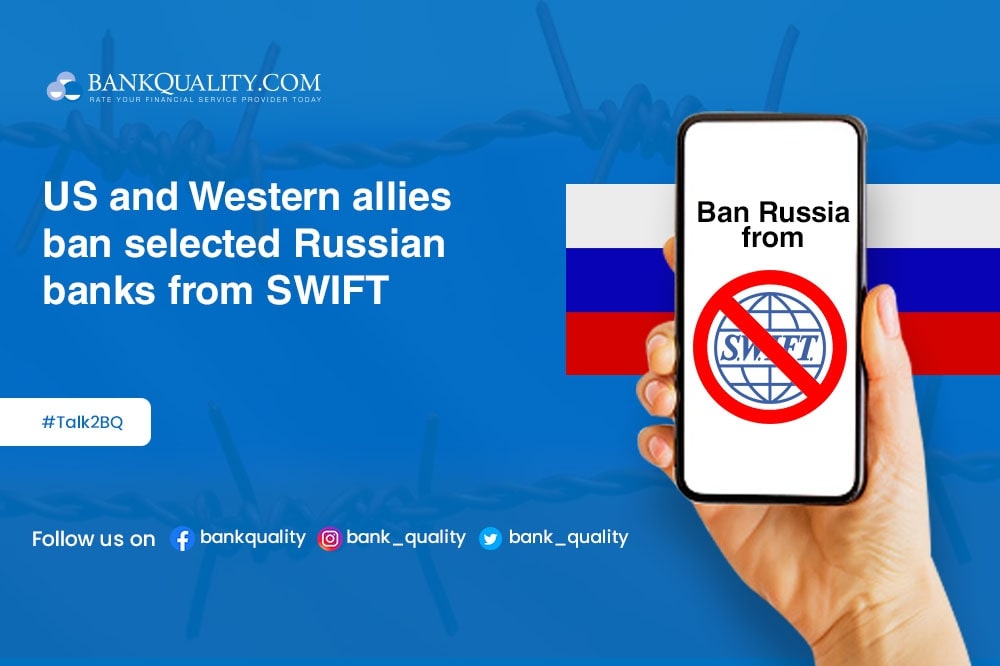
United States (US), United Kingdom (UK), European Union (EU) and allies banned several Russian banks from SWIFT to disrupt its banking network and in support of Ukraine.
US, UK, EU and their allies have decided to lock several Russian banks out of SWIFT, which is a secure international banking payments network. There has been an escalating pressure to implement greater sanctions on Russia, as Russian President Vladimir Putin continues to attack Ukraine.
The European Commission (EC) said, "We commit to ensuring that selected Russian banks are removed from the SWIFT messaging system and that these banks are disconnected from the international financial system”.
The White House said this ban "will ensure that these banks are disconnected from the international financial system and harm their ability to operate globally". The movement will restrict certain banks of Russia from international payments. Ukraine's government demanded a complete ban on Russia to access the banking system.
The White House said the countries condemned “ Putin’s war of choice and attacks on the sovereign nation and people of Ukraine”. “We will hold Russia to account and collectively ensure that this war is a strategic failure for Putin, it added.
UK and Spain were the early supporters of this move and wanted to fence off Russia but the US was not taking a decision initially, while Germany was resistant to imposing this ban.
On 26 February 2022, Germany’s foreign minister Annalena Baerbock said the country supported the “targeted and functional restriction of SWIFT”. Hours later, the joint statement of Western Allies was released. EC President Ursula von der Leyen announced the measure which “The EU and its partners are working to cripple Putin’s ability to finance his war machine”.
Source: Twitter
SWIFT or the "Society for Worldwide Interbank Financial Telecommunication" is a secure messaging system that facilitates fast rapid cross-border payments. Established in 1973, Belgium-based SWIFT currently links 11,000 banks and institutions in more than 200 countries. SWIFT is not a traditional financial institution, but a sort of instant messaging system that informs users about incoming and outgoing payments.
Banning Russian banks from SWIFT matter
The expelled institutions consist of VTB Bank, Bank Otkritie, Novikombank, Promsvyazbank, Rossiya Bank and Sovcombank, as well as VEB, Russia's Development Bank.
Banning selected Russian banks from SWIFT makes it harder for them to access financial markets around the world. SWIFT sends more than 40 million messages a day, and more than 1% of those messages involve Russian payments. It will be difficult for Russian businesses and individuals to make daily international transactions. The banks will be forced to directly deal with one another, which causes delays, and extra money and reduce revenues for the Russian government.
Von der Leyen said, “Cutting banks off will stop them from conducting most of their financial transactions worldwide and effectively block Russian exports and imports”.
She added, “We will paralyse the assets of Russia’s central bank. This will freeze its transactions and will make it impossible to liquidate assets. Finally, we will work to prohibit Russian oligarchs from using their financial assets on our markets”.
SWIFT said, “We are engaging with European authorities to understand the details of the entities that will be subject to the new measures and we are preparing to comply upon legal instruction.”
Central Bank of Russia faced sanction
Along with imposing a ban to access SWIFT, Russia’s central bank was prevented from utilising its international reserves as stated by the EC. This will effectively cut $600 billion (EUR536 billion) in foreign currency reserves of the Russian government. As a result, the Russian Ruble fell by almost 26% and the central bank decided to increase the interest rates from 9.5% to 20% to save the risks of inflation. "External conditions for the Russian economy have drastically changed," the central bank said.
Russia has already faced a threat with a SWIFT dismissal in 2014 when it took possession of Crimea. At that time, Russia said this move would be equal to a declaration of war. Western Allies didn’t take a step further and were criticised for a weak response. Russia developed its cross-border transfer system known as a National Payment Card System (Mir) to process card payments.